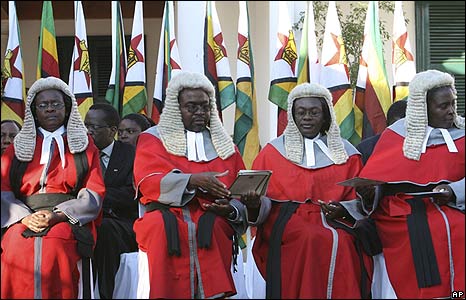 Democracies are hardly well-oiled machines, but African courts – as in the U.S. – are pulling rank and calling all the important shots.
Democracies are hardly well-oiled machines, but African courts – as in the U.S. – are pulling rank and calling all the important shots.
There are a score of new, fresh democracies in Africa in the last generation.
In South Africa, Kenya … but also in Zambia, Malawi, and most of the west African countries, democratic constitutions mostly replaced completely far less democratic ones that were distinguished by very long-serving dictators.
Out of this slow transformation of the continent’s form of governance is emerging a singular outcome: the courts rule.
As to be expected with new constitutions, precedent must be set in the interpretation of complex wording, and that has led to a lot of court rulings regarding personal and press freedom, entitlements and budgetary processes. This is to be expected.
But my interest in this question goes far beyond the obvious.
In Kenya, the courts decided the outcome of the presidential election and continue to decide dozens of elections at lower levels.
While the presidential election was a question over the counting of a very close contest, most of the elections being adjudicated by the Kenyan courts at lower levels are less technical, like whether the victor is fit to serve.
The Kenyan courts are ruling not just who won, but who should win.
In Zambia, the court is about to decide if the powerful President Zata should remain in power because of his health.
South Africa is the most jurisprudence minded on the entire continent. It was here, after all, that the chief and many of the jurists of the supreme court which upheld the immoral laws of apartheid remained the same justices which then systematically dismantled it.
Contrasting the attention and minuscule jurisprudence attending the current South African trial of Oscar Pistorius, South Africa’s Daily Maverick recently claimed that for the vast majority of South Africans the country’s new justice system was “broken beyond imagination.”
Important hearings for bail, sentencing for things like tax arrears and petty crimes, are being summarily dispensed with “not much heed … to the principles of a fair trial.”
While fresher democracies like Kenya are being ruled by the courts from the top down, the Daily Maverick claimed that South Africans are being ruled by the court from the bottom up.
It’s true here, too, at home in the good ole USA.
There’s got to be a correlation here. I think what’s happening is that the courts are filling a power gap.
In a tricameral government where an executive, legislature and the courts are separate but coequal, functioning power is possible when either one is dictatorial or two others at least are working together.
I don’t think even the U.S. Supreme Court can be called dictatorial. There’s no question in my mind that the current high court is the most activist we’ve had in my lifetime, but there’s been enough ambivalence (Obamacare) to suggest it isn’t completely dictatorial.
But because our president has not been forceful, and because our Congress is mired to a halt, the opportunity arises for the court to be proactive.
In fact, this is exactly what’s happening in Africa.
It’s a contentious time, for some further more complicated reason, throughout the world in terms of people coming together to govern.
Perhaps it’s residue from the Great Recession. Perhaps climate change is putting us to sleep.
Whatever the fundamental cause, the activists courts in the U.S. and in Africa, which seem so obstreperous lately might be considered in a slightly better light: at least they’re doing something.